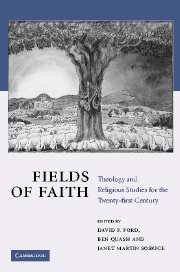Book contents
- Frontmatter
- Contents
- Notes on contributors
- Introduction
- PART I THE END OF THE ENLIGHTENMENT'S NEUTRAL GROUND
- 1 The study of religion and the rise of atheism: conflict or confirmation?
- 2 Doing Theology in the university
- 3 Shaping the field: a transatlantic perspective
- 4 The study of religion as corrective reading
- PART II MEETINGS ON MUTUAL GROUND
- RESPONSE
- Index of names
- Subject index
3 - Shaping the field: a transatlantic perspective
Published online by Cambridge University Press: 22 September 2009
- Frontmatter
- Contents
- Notes on contributors
- Introduction
- PART I THE END OF THE ENLIGHTENMENT'S NEUTRAL GROUND
- 1 The study of religion and the rise of atheism: conflict or confirmation?
- 2 Doing Theology in the university
- 3 Shaping the field: a transatlantic perspective
- 4 The study of religion as corrective reading
- PART II MEETINGS ON MUTUAL GROUND
- RESPONSE
- Index of names
- Subject index
Summary
INTRODUCTION AND OUTLINE
Let me start this short essay of salutation to Nicholas Lash with a quotation from his own writing with which many will be familiar. It is to be found in the opening section of his book The Beginning and the End of ‘Religion’ (1996), and runs thus:
… the view that ‘religion’ is the name of one particular district which we may inhabit if we feel so inclined, a region of diminishing plausibility and significance, a territory quite distinct from those we know as ‘poetry’ and ‘art’, as ‘science’ and ‘law’, and ‘economics’; this view of things, peculiar to modern Western culture, had a beginning in the seventeenth century, and (if ‘post modern’ means anything at all) is now coming to an end.
In what follows I shall be taking much of these sentiments as read, however contentious they may remain in some quarters. Yes, the falsely unifying, and inadvertently ghetto-ising, notion of ‘religion’ was indeed a distinctively Western, European product. It served particular political functions in an era of so-called ‘toleration’; and it allowed ‘other’ ‘religions’ to be safely characterised as variations on a covertly assumed Christian norm. It also enabled such ‘religions’ to be theorised as intrinsically interior phenomena, and thus purportedly rendered them neatly distinguishable from the other more ‘public’ spheres and activities mentioned by Lash.
- Type
- Chapter
- Information
- Fields of FaithTheology and Religious Studies for the Twenty-first Century, pp. 39 - 55Publisher: Cambridge University PressPrint publication year: 2005
- 2
- Cited by



